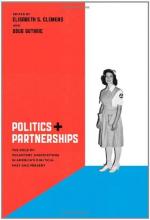|
This section contains 2,759 words (approx. 10 pages at 300 words per page) |

|
The 1990s saw renewed interest in and concerns about voluntary associations and their roles in society. On the international level, countries that had been part of the Soviet Union and its power bloc continued to form and experiment with what they called "informal groups," which had the essential characteristics of voluntary associations. That is, those groups were independent of control from outside sources, people were free to join or leave them, and members established their own objectives and goals and developed means that might achieve them. Among the most important developments arising from these informal groups was the emergence of political parties as part of the struggle to establish democratic governments.
Origin of the Idea of Voluntary Associations
It is generally acknowledged that the origins of voluntary associations are in the writings of early Reformation leaders such as Martin Luther and John Calvin (Hooker 1997). Calvin taught...
|
This section contains 2,759 words (approx. 10 pages at 300 words per page) |

|


